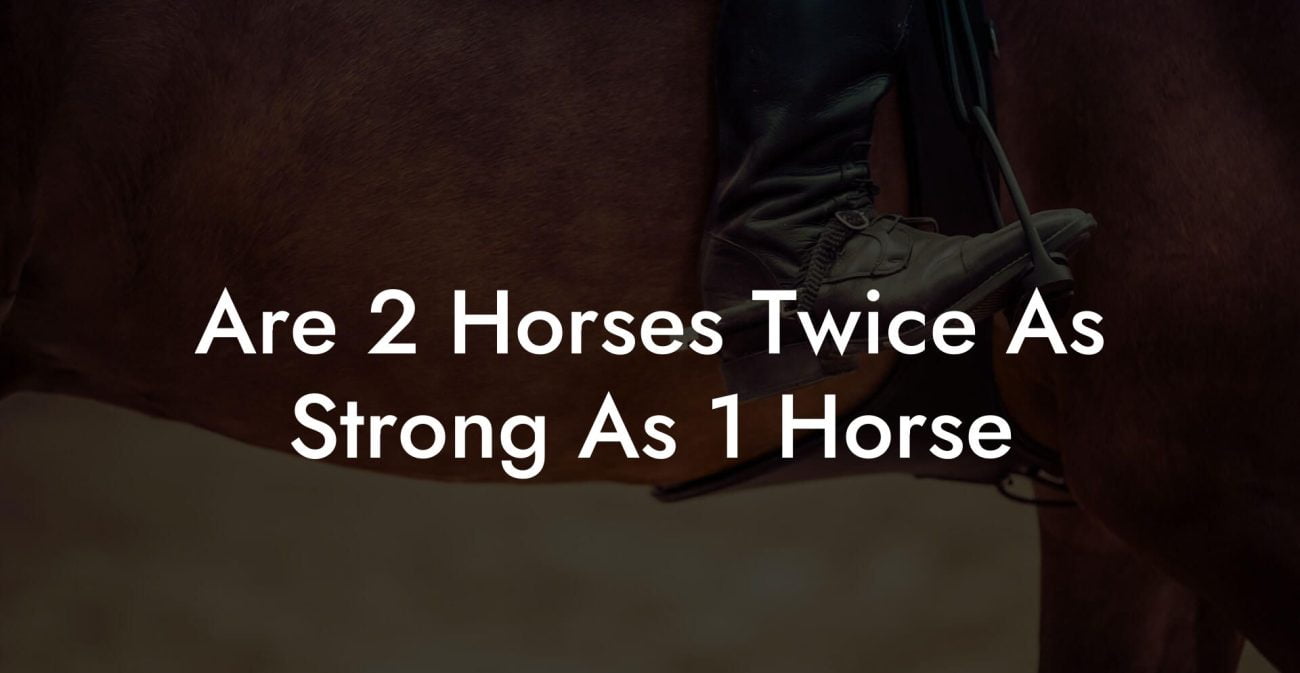There’s nothing quite like the raw energy of a Quarter Horse, whether you're grooming, riding, or simply admiring these incredibly versatile equine athletes. Picture this: your favorite four-legged buddy strutting its stuff with a well-toned frame, built not only for speed and agility but for endurance and power. And if you’ve ever wondered, “What is the average weight of a Quarter Horse?” you’re not alone. Let's dig into the details, share some insider tips on weight management, and explore how proper care can ensure your horse stays in top form.
Quick Links to Useful Sections
- Understanding the Quarter Horse Phenomenon
- So, What Is The Average Weight of a Quarter Horse?
- What Factors Influence a Quarter Horse’s Weight?
- Evaluating Body Condition: More Than Just a Number
- Measuring and Monitoring Weight: Tools and Techniques
- Weight Tapes
- Using a Scale
- Photographic Evaluation
- Nutrition and Exercise: Cornerstones of Equine Weight Management
- Feeding the Quarter Horse Right
- Exercise Regimens for a Fit Quarter Horse
- Common Weight Issues in Quarter Horses and How to Address Them
- Overweight Quarter Horses
- Underweight or Malnourished Horses
- Case Studies: Real-Life Journeys in Quarter Horse Weight Management
- The Lean Champion
- A Journey to Shed the Extra Pounds
- Rediscovering Strength with a Balanced Diet
- Nutritional Considerations: Feeding Your Horse for Lifelong Health
- Exercise and Activity: Keeping Your Quarter Horse Fit and Fabulous
- Integrating Modern Technology in Horse Care
- Understanding the Role of Genetics and Environment
- Resources and Community Support: Your Next Steps
- Building a Personalized Quarter Horse Care Plan
- Step 1: Comprehensive Assessment
- Step 2: Set Clear Goals
- Step 3: Tailor Nutrition and Exercise
- Step 4: Monitor, Evaluate, and Adapt
- Frequently Asked Questions About Quarter Horse Weight
- Your Journey to Empowered, Holistic Equine Health
Understanding the Quarter Horse Phenomenon
Quarter Horses are more than just a breed; they’re a cultural icon, renowned for their quick bursts of speed, strong work ethic, and unparalleled versatility. Originating from the American West, these horses have become the gold standard for ranch work, rodeo events, and competitive sports. Their muscular build, compact body, and agile frame make them the perfect partner for everything from trail riding to barrel racing.
When you think about a Quarter Horse, imagine a creature that embodies both strength and agility, one that can charge down a quarter-mile in a blink yet also stand gracefully with body condition that signals peak health. This breed’s impressive physique isn’t just about looks; it’s a result of generations of careful breeding, selective nutrition, and the perfect balance of exercise and rest.
For Gen-Z and millennials alike, who are often at the forefront of embracing modern lifestyles and holistic care techniques, learning about a Quarter Horse’s physical needs is as much about understanding state-of-the-art animal care as it is about celebrating a fascinating breed steeped in tradition and vigor.
So, What Is The Average Weight of a Quarter Horse?
The short answer: it’s usually between 900 and 1,200 pounds. However, as with any living being, there are a host of factors that can cause this number to fluctuate, ranging from genetics to the specifics of diet, exercise routines, and overall care practices. Think of it as a spectrum where each horse has its own ideal weight range, giving you insight into not only how your horse looks, but how they function and perform.
Delving deeper, you’ll find that a fully grown Quarter Horse can vary depending on its usage and environment. Dual-purpose Quarter Horses used on the ranch might lean toward a beefier physique, while those bred for speed in competitive arenas might show off a leaner, more athletic build. Understanding these nuances is key when you’re tailoring a care regimen that fits your horse’s lifestyle, because your horse isn’t just a pet; it's a partner in adventure.
Whether you're a seasoned horse owner or just beginning to dive into the world of equine care, knowing the average weight is your starting point for ensuring the holistic health of your animal companion. Not only does keeping an eye on weight help you spot potential health issues, but it also plays a pivotal role in decisions about nutrition and exercise routines.
What Factors Influence a Quarter Horse’s Weight?
Just like in most living beings, a Quarter Horse’s weight is determined by several key factors:
- Genetics: The breed standard provides a general framework, but individual genetic variation means some horses are naturally predisposed to a more muscular build, while others are leaner.
- Age and Growth: Foals gain weight rapidly as they grow, and mature horses tend to plateau once they reach full growth. Weight fluctuations can also occur due to seasonal changes and life stages (think pregnancy or senior years).
- Nutrition: The quality and type of feed, whether it's a nutrient-dense hay, grain supplements, or pasture grazing, play a significant role. A diet balanced with the right mix of proteins, carbohydrates, and minerals is crucial to maintaining optimal weight.
- Exercise and Activity Level: Active horses that participate in regular exercise or competitive sports may have a leaner build compared to those with a more sedentary lifestyle.
- Health Status: Conditions such as metabolic issues, digestive health, and even stress can impact weight. Regular veterinary checks and body condition scoring are important to catch discrepancies before they become concerns.
These factors intertwine to create the unique physical blueprint of each Quarter Horse. The art of horse care lies in understanding how they interact, recognizing that a heavier weight isn’t always a sign of poor health, and a leaner physique isn’t automatically indicative of peak fitness.
Evaluating Body Condition: More Than Just a Number
It’s crucial to move beyond just the number on a weight tape or scale. While knowing the average weight range (900 to 1,200 pounds) provides a helpful benchmark, evaluating the overall body condition score (BCS) offers a holistic view of your horse’s health. The BCS assesses muscle tone, fat distribution, and overall conformation to determine whether your horse is underweight, in a healthy range, or overweight.
Here’s how you can assess your Quarter Horse’s condition:
- Visual Inspection: Look at the horse’s neck, withers, and hindquarters. Are there visible plumps or overly lean areas?
- Palpation: Gently feel the muscle and fat deposits along the ribs and back. A good rule of thumb is that you should be able to feel the ribs without them being overly pronounced, and yet they shouldn’t be entirely hidden by thick fat.
- Behavioral Cues: Changes in performance, energy level, or even mood can indicate whether a horse’s weight is in balance with its overall health.
For those of you who love leveraging technology, there are even mobile applications now available that help you measure and track these scores, ensuring you can monitor your horse’s progress in real time. Remember: a healthy body condition is a sign of balanced nutrition, regular exercise, and proper management.
Measuring and Monitoring Weight: Tools and Techniques
So, how do you get a reliable reading of your Quarter Horse’s weight? While high-tech scales are available at specialized veterinary centers, there are practical methods you can use at home:
Weight Tapes
A weight tape is an affordable, user-friendly tool that you simply wrap around your horse’s girth. This measurement is then applied to an equation that gives you an estimated weight. While not as precise as a scale, weight tapes provide an excellent means of tracking trends over time, especially useful if you’re making changes to your horse’s diet or exercise regimen.
Using a Scale
If you have access to an equine scale, that’s your best bet for an accurate measurement. Scales are especially useful for horses who are undergoing critical dietary adjustments or recovering from an illness. They offer a precise snapshot of your horse’s weight at any given moment.
Photographic Evaluation
Believe it or not, regular photography can also be a useful tracking tool. By visually documenting any weight changes, like a subtle change in the appearance of muscle tone or fat deposits, you can often identify trends that might go unnoticed between scale readings.
Regardless of the method, consistency is key. Regular monitoring helps establish a reliable trend that allows you to catch potential problems before they escalate into serious health issues.
Nutrition and Exercise: Cornerstones of Equine Weight Management
Nutrition and exercise are the dynamic duo in ensuring your Quarter Horse stays in the optimal weight range. Just as you wouldn’t put the wrong fuel in your car, feeding your horse the right mix of nutrients is imperative for long-term health. Here are some essential tips:
Feeding the Quarter Horse Right
A balanced diet for a Quarter Horse typically includes high-quality forage (like hay) paired with grains and supplements that provide the necessary vitamins and minerals. Here are some considerations:
- Forage First: Hay and pasture should make up the majority of your horse’s diet, providing the fiber necessary for proper digestion. Ensure that the hay is clean, free of mold, and appropriate for your horse's age and activity level.
- Grains and Concentrates: These provide the extra energy needed for highly active horses. Be mindful, though, a change in grain mix or overfeeding can quickly lead to unwanted weight gain.
- Supplements and Minerals: Depending on your horse’s specific needs, supplements such as omega-3 fatty acids, joint support formulas, and vitamin–mineral complexes might be useful. Always consult a veterinarian or equine nutritionist to tailor a diet plan that meets your horse’s unique needs.
Being part of a modern, tech savvy generation means you might also be inclined to use digital feeding trackers or smart apps that help schedule and monitor your horse’s nutritional intake, empowering you with data to make informed decisions.
Exercise Regimens for a Fit Quarter Horse
Exercise is the other half of the equation. Regular physical activity not only maintains muscle tone and supports cardiovascular health but also helps regulate weight. For Quarter Horses, exercise routines can include:
- Controlled Riding Sessions: Depending on your horse’s age and training, regular riding can be adjusted to meet their fitness level. This might include slow trail rides, brisk work in the arena, or agility exercises for those in competitive sports.
- Ground Work and Agility Drills: These sessions focus on developing strength, coordination, and flexibility, and can include exercises like lateral movements, hill work, and even obstacle courses that challenge your horse both mentally and physically.
- Cool-Down and Stretching: Just as humans benefit from stretching after a workout, so do horses. Incorporating cool-down periods with gentle stretches after intensive activity aids in muscle recovery and helps prevent injuries.
A well-structured exercise plan, matched with the right nutritional strategy, not only ensures that your horse maintains a healthy weight but that they also perform at their absolute best, ready to take on everything from a playful gallop across the pasture to a nerve-wracking competitive event.
Common Weight Issues in Quarter Horses and How to Address Them
Just like people, horses can face weight-related challenges. Whether your horse is a supermodel at 1,100 pounds or a slightly underweight competitor at 850, identifying the issue early is crucial.
Overweight Quarter Horses
Overnutrition, combined with insufficient exercise, can lead to weight gain and subsequent health issues like laminitis and joint stress. Signs to watch for include a bloated appearance around the ribs, sluggish movement, and difficulty in long rides. If you notice these symptoms, consider a few steps:
- Reassessing Their Diet: Cut back on high-calorie concentrates while ensuring they still receive adequate nutrients from quality forage.
- Increasing Activity: Gradually incorporate more exercise into their day, from longer trail rides to fun agility challenges, while monitoring their recovery.
- Consult Your Vet: In some cases, a veterinarian can offer tailored advice or prescribe a specific weight management program to safely shed the extra pounds.
Underweight or Malnourished Horses
On the flip side, an underweight horse might signal issues like poor digestion, inadequate feed, or even underlying health conditions. Look for signs such as a visibly gaunt frame, lack of muscle tone, and decreased energy levels.
- Reviewing Feeding Practices: Ensure your horse’s diet is robust, offering high-quality hay and a balanced dose of grains or concentrated feeds.
- Digestive Health Checks: Sometimes, weight loss may be related to digestive issues. Regular vet check-ups and appropriate supplements can support gut health.
- Environmental Enrichment: A stress-free environment not only improves digestion but boosts overall well-being. Social interaction, a clean stable, and routine can make a significant difference.
Addressing these weight issues early can be the difference between a long, comfortable life and prolonged health challenges. For the modern horse owner, it’s all about a proactive approach, leveraging both traditional veterinary insights and modern tech to keep your horse healthy.
Case Studies: Real-Life Journeys in Quarter Horse Weight Management
To illustrate just how transformative proper weight management can be, let’s take a look at a few real-life case studies of Quarter Horses and their dedicated caretakers:
The Lean Champion
Meet Bella, a spirited Quarter Horse with a rich history of competitive barrel racing. Bella was always on the leaner side, which many initially worried might compromise her strength, but her owner knew that every horse’s ideal weight is uniquely individual. By tracking her feed intake, monitoring her body condition, and tailoring an exercise regimen that combined both intense bursts and recovery periods, Bella maintained an athletic and muscular build. Her story underscores that being on the leaner end of the spectrum does not mean a lack of performance, it can mean a fine-tuned balance between speed and power.
A Journey to Shed the Extra Pounds
Then there’s Duke, a larger-than-life Quarter Horse who, after years of indulgent feeding and minimal exercise, tiptoed dangerously close to obesity. Concerned about the onset of joint issues and laminitis, Duke’s caretaker revamped his entire care regimen. With a gradual shift to a controlled diet rich in quality forage, regular rides, and dedicated ground work, Duke slowly transformed into a fit, agile athlete. His journey is a testament to the transformative power of holistic horse care.
Rediscovering Strength with a Balanced Diet
Lastly, consider the case of Scout, a middle-aged Quarter Horse whose weight had fluctuated widely over the years due to a sporadic feeding routine and inconsistent exercise habits. Once a high-performing competitor, Scout was showing signs of fatigue and muscle loss. By incorporating regular weight checks, optimizing nutritional intake with refined supplements, and establishing a consistent exercise program, Scout gradually reclaimed his peak performance. These success stories not only highlight the importance of managing weight but affirm that every horse, regardless of its starting point, can achieve a healthier, more balanced life with the right approach.
Nutritional Considerations: Feeding Your Horse for Lifelong Health
One of the greatest joys of owning a Quarter Horse is learning to feed them right. Nutrition is not just about the calories, it’s about balancing everything from high-quality forage to essential supplements. For the modern horse owner, armed with smart apps and a dedication to holistic care, creating a nutritional plan that works can be a fun and exciting challenge.
Start with the basics: aim for a diet that’s 70-80% forage. Quality hay or pasture brings fiber and promotes healthy digestion. Once you’ve nailed down your forage game, consider incorporating grains, but be cautious: too much starch can upset digestion and lead to unwanted weight gain. For horses with high energy needs, such as those in competitive sports, controlled amounts of oats, barley, or specially formulated feeds can provide that extra boost.
And let’s not forget the supplements! Omega-3 fatty acids, vitamins, and joint support supplements can add an extra layer of protection and performance. With today’s plethora of options, you can fine-tune your horse’s diet to not only maintain a healthy weight but to optimize overall wellness.
Exercise and Activity: Keeping Your Quarter Horse Fit and Fabulous
Exercise is where the magic happens. It not only helps regulate your horse’s weight but also boosts their overall mood, performance, and longevity. Remember, every horse is unique, so tailoring workouts to fit their strengths and temperament is key.
For the sporty equine, structured workouts in the arena that focus on bursts of speed, agility drills, and targeted strength exercises will keep them in prime condition. For those more laid-back horses who might not be built for high-octane activity, gentle trail rides, controlled ground work, and even nature walks through the pasture can be equally beneficial.
In today’s digital era, many modern riders embrace technology to track exercise routines. Wearable fitness trackers for horses, scheduling apps, and even smart stable systems can help you monitor activity levels, measure performance, and adjust routines as needed. The bottom line is: an active Quarter Horse is a happy and healthy Quarter Horse.
Integrating Modern Technology in Horse Care
It’s 2023, and smart technology is revolutionizing every aspect of life, including how we care for our equine friends. From digital weight trackers and body condition scoring apps to smart feeders and health monitoring devices, these tools are making it easier than ever for horse enthusiasts to keep a close eye on their animal’s well-being.
Imagine receiving a notification on your phone that it's time for a diet adjustment or a reminder that your horse’s last weight measurement is trending upward. These systems help you stay ahead of potential health concerns, ensuring you can act quickly and efficiently. With a proactive approach powered by technology, you’re not just caring for your horse, you’re empowering them to thrive in a modern, fast-paced world.
Understanding the Role of Genetics and Environment
Genetics plays a significant role in shaping your Quarter Horse’s physique. While the breed standard provides a general blueprint, it’s important to remember that each horse is unique. Some horses are blessed with a naturally muscular build that supports athletic performance, while others may exhibit a leaner frame perfect for agility and speed.
Environment, too, plays a clash-and-blend role in your horse's overall weight. The quality of feed, the type of exercise available, whether a horse is working in the heat of the southwest or the cool climes of the north, and even local pasture conditions all contribute to fluctuations in weight and overall health. Balancing these factors in a holistic care regimen means regularly consulting with your veterinarian and nutritionist, and sometimes making adjustments based on seasonal changes.
And don’t forget about stress management. Horses are incredibly perceptive to their surroundings, and even a slight change in their routine can impact their weight and health. Incorporating calm environments, consistent training schedules, and even natural remedies or massage therapy can all contribute to a well-rounded care strategy.
Resources and Community Support: Your Next Steps
In our hyper-connected age, you’re never alone on your journey to mastering equine care. Whether you’re looking for expert advice on quarter horse nutrition, exercise routines, or technological tools to track health, countless online communities and forums are eager to share their experiences. Websites dedicated to equine health, YouTube channels offering in-depth tutorials, and even social media groups can provide that extra boost of inspiration and practical knowledge.
Consider joining local horse clubs or online groups where fellow enthusiasts swap tips, success stories, and even humorous anecdotes about the ups and downs of horse care. The support of a community that genuinely understands the highs and lows of managing a Quarter Horse’s health can be the secret ingredient to long-term success. So, whether you’re seeking innovative feeding strategies or the latest in smart stable technology, remember that resources are just a click away.
Tap into these networks, attend webinars, and consider reaching out to equine specialists who can offer personalized advice, a real game-changer in ensuring your four-legged friend not only meets but exceeds the standards of modern care.
Building a Personalized Quarter Horse Care Plan
One size does not fit all when it comes to caring for your Quarter Horse, so building a personalized care plan is the way forward. Start by combining what you know about weight averages and body condition with the specifics of your horse’s individual lifestyle, environment, and genetic profile.
Here are some steps to build a robust care plan:
Step 1: Comprehensive Assessment
Schedule a vet visit to evaluate your horse’s current body condition, discuss nutrition options, and identify any underlying health issues. Utilize digital tools to record initial measurements like weight and body condition scores, which serve as your baseline.
Step 2: Set Clear Goals
Define what success looks like, whether that's maintaining a weight in the healthy 900-1,200 pound range, improving muscle tone, or achieving peak athletic performance. Setting clear, measurable goals will help guide your daily routines.
Step 3: Tailor Nutrition and Exercise
Craft a nutrition plan that meets your horse’s dietary needs and pair it with an exercise regimen that challenges them without overtaxing their muscles. Utilize apps or journals to track ritual progress and adjust as needed.
Step 4: Monitor, Evaluate, and Adapt
The journey to optimal equine health is dynamic. Regular monitoring lets you see trends and instantly address potential issues, whether by tweaking the diet, changing up the workout routine, or introducing new stress-reduction techniques.
With every update to your care plan, you become more in tune with your Quarter Horse’s needs, ensuring an enduring healthy bond and sustained performance that mirrors both science and heart.
Frequently Asked Questions About Quarter Horse Weight
We know you’ve got questions! Here are some of the most common queries about Quarter Horse weight, care, and management:
1. What is the typical weight range for a mature Quarter Horse?
Most mature Quarter Horses weigh between 900 and 1,200 pounds. However, individual weight can vary based on factors like genetics, diet, and activity level.
2. How often should I monitor my horse’s weight?
It’s a good idea to check your horse’s weight or body condition score every few months, or more frequently if you notice significant changes in their diet or activity level.
3. What tools can I use at home to estimate my horse’s weight?
Weight tapes are a popular, affordable option for tracking weight trends. For a more accurate measurement, you can use an equine scale if it’s available.
4. How can I adjust my horse’s diet if they are overweight?
Reducing high-calorie feeds, ensuring quality forage forms the bulk of the diet, and increasing exercise are key steps. Consult your veterinarian or nutritionist for a customized plan.
5. Can technology help me track my Quarter Horse’s weight and overall health?
Definitely. Many modern apps and smart devices are designed to track equine health metrics such as weight, activity levels, and even body condition scores, making it easier to monitor trends over time.
6. What other factors should I consider besides weight?
In addition to weight, the body condition score, muscle tone, overall energy levels, and changes in behavior all provide important insights into your horse’s health.
7. How often should I consult with a veterinarian about my horse’s weight?
Regular check-ups at least twice a year are advisable, especially if you notice any changes in your horse’s body condition or performance.
Your Journey to Empowered, Holistic Equine Health
Embracing the art and science of Quarter Horse care is a journey, a dynamic blend of traditional wisdom and modern innovation. By understanding that the average weight is just one aspect of a much larger picture, you empower yourself to craft a care regimen that truly caters to your horse’s unique needs.
Every measurement, every adjustment in diet and exercise, and every social interaction builds toward a healthier, more vibrant equine companion. Whether you’re tweaking a feeding schedule, introducing a new interactive toy, or sharing a laugh with fellow horse enthusiasts online, you’re part of a movement that’s reshaping animal care.
So here’s to a future where your Quarter Horse not only meets the standard weight ranges but thrives in every sense, strong, agile, and full of energy. Your keen eye for detail and commitment to holistic care are what make the journey worthwhile. Embrace these practices, trust the process, and celebrate every milestone along the way.
Remember, the best care stems from knowledge, passion, and a willingness to adapt. Whether you’re a longtime equine aficionado or a curious newcomer, your journey toward empowered, holistic equine health is just beginning. Let every step, every gallop, and every shared story inspire you to nurture your horse with the attention, care, and modern techniques they deserve.













